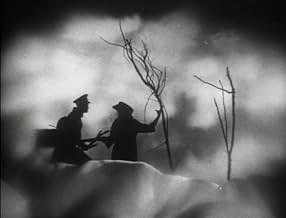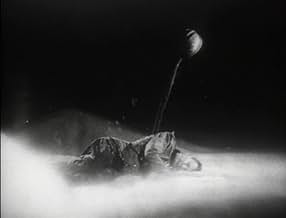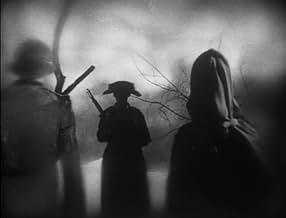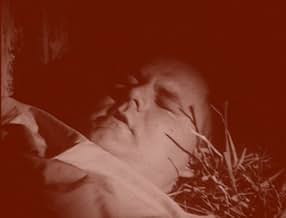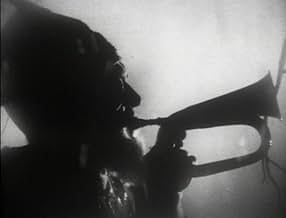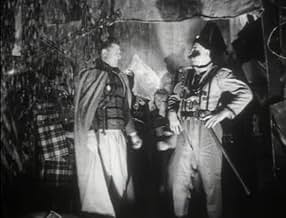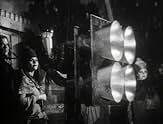Agrega una trama en tu idiomaAn amnesiac soldier, seeking his lost love, arrives in Archangel in northern Russia to help the townsfolk in their fight against the Bolsheviks, all quite unaware that the Great War ended th... Leer todoAn amnesiac soldier, seeking his lost love, arrives in Archangel in northern Russia to help the townsfolk in their fight against the Bolsheviks, all quite unaware that the Great War ended three months ago.An amnesiac soldier, seeking his lost love, arrives in Archangel in northern Russia to help the townsfolk in their fight against the Bolsheviks, all quite unaware that the Great War ended three months ago.
- Dirección
- Guionistas
- Elenco
- Premios
- 1 premio ganado en total
- Stage Kaiser Wilhelm II
- (as Snyder)
- Baby
- (as Graham Blicq)
- Dirección
- Guionistas
- Todo el elenco y el equipo
- Producción, taquilla y más en IMDbPro
Opiniones destacadas
This is a capital D Deam of silent and experimental/avant-garde cinema, and excavation practically of a dream in a sense, and a dream-cum-nightmare of war, and it looks at the world of Patriarchy (from male romantic dominance to how someone disciplines a child. There is also such glorious absurdity and as soon as those folks packed into that small house on the outskirts of Russia tend to that child who just had a stroke for some reason (!) With careful and gentle horse brushes all over his body (!!), you know this is something you have to take on its crazy terms.
But then again war is crazy, and the people who create Boogeymen out of the likes of the Bolsheviks - big monster men with big ears and big claws, after all, and can only be taken out after a coward uses his expunged intestines to strangle the brutes - should be mocked. Like in a Dream, or a nightmare, or a mix of light and dark together (like an Avant-Garde cup of coffee), it is not something that you piece together logically but by how it is based in spme unidentified place in time with a protagonist who is losing his grip on his own constructed reality (if it was there at all).
Archangel is unique also as both romantic and ironic storytelling at the same time, and it is an incredibly tricky prospect for Maddin to balance both tones but he kind of gets there, and I don't mean just that with Boles and the woman named Veronika who he says/demands/confusingly misremembers is Iris; the shots where characters get on horses or carriages, which you know was done in a room with like fake snow being blasted at someone's face and a rocking from side to side on a low grade rig, it speaks to something we love about how tactile the movies can be and how they conjure such visions that can *only* be done on film. This also goes to moments and shots where it is those two actors sharing the frame or looking at one another (sometimes with memories intact and sometimes... not).
Is some of the dubbing sketchy? Actually, not as much as you'd think (or now that I told you the movie is dubbed with dialog it already has an uphill battle, right), and because of the milky and smoky black and white atmosphere and the equally play-dress up and believablity Maddin has some breathing room to have his actors mouth to their movements and the artifice plays into it all. And are there moments or times when the pacing gets a little odd? Sure, it's an Expressionistic Canadian (post?! Kind of WW1 memory piece about memory loss and gruesome male dominated violence!
But it is so much fun and you can feel the heart and sweat put into it while none of it feels like it had so much effort as could have happened on a low/microbudget. There's madness and kindness and, again, rabbits and weird gooey blood, and it all works.
Like all of Maddin's other films, Boles is and anti-hero, his subversive obsession with Veronika could not be interpreted as love or heroic, a brillliant deconstruction of your average war movie.
The ending is a bit disappointing (out of the brooding character with the rest of the film) but in all a great film.
I'm really beginning a deep appreciation of this man's visual soul. While this project didn't change my life, it demonstrated the power to do so, like a strutting policeman among weak minds.
What I like about his mind is how he seats the thing first in the soul, then in the cinematic vocabulary instead of the usual path which values character, motivations, narrative clarity. What he's done here is revisit Eisenstein. I don't suppose many filmgoers have much truck for a Russian silent filmmaker who was primarily occupied in Soviet propaganda. He developed some important ideas about how a scene (never a movie only a scene) can be constructed from visual fragments what it means to "see."
His particular solutions aren't popular today, and the whole idea of slicing the eye has been appropriated to the service of now-conventional values of storytelling and the cult of celebrity some few jokes and even fewer emotions destinations.
Eisenstein's idea is based on the notion of readable cells of retinal comprehension, more or less of the same size which when combined give an impression. The more discrete the components in presentation the more comprehensible the assembly, what he called the collage.
What Maddin does here is make a metaEisenstein. The story is set in Russia and populated by international warriors, all of whom have only a groggy notion of why they are there. Our hero, like Maddin, is Canadian. It is essentially a silent movie. There is a parallel movie that is a talkie, into which this silent, main piece is embedded.
Within the silent movie is a sort of "movie within," exactly as abstract from the silent portion as the silent portion is to the talkie portion and thence not to our world (as is the usual case with folding) but to the world of normal movies.
That "movie within" is the "illumination" a set of stage tableaux depicting famous battles. If you experience nothing but these or rather if you skate over all the surrounding context and focus only on these you will be rewarded. There's so much reference there.
The overall theme of the thing is the hard boundary of memory, where the continuity of knowing begins and ends. In the story, this exhibits as amnesia plus a sort of quantum identity shifts of women, who else? That's good, its valuable. But the interesting thing is how this is seated in the collage itself. Eisenstein's idea is that each cell, each image, of the collage needs to have some reference to the others. The art is in the nature of that reference.
Maddin makes that reference sit on the cells. In his case they are not bubbles in transparent foam that light can shine through. Instead they are stones, smooth stones with hard impenetrable skins that only know themselves and keep forgetting those they are nestled against. So they forget who they are.
Ted's Evaluation -- 3 of 3: Worth watching.
Filming entirely indoors with homemade props and costumes, director Guy Maddin has created a very strange and intense movie. Cribbing heavily from the look and atmosphere of German expressionist cinema, Maddin goes much further in exploring some very human issues: loss, love, memory and redemption. He also examines patriotism and by stylistically depicting the horrors of trench warfare he delivers a pacifist message that reminds me of movies like Grande Illusion and All Quiet on the Western Front. The ultimate power of this movie, however, lies in the sense of alienation we see among the characters. They are not only unable to love each other, they are barely able to communicate. In fact, under the cloud of forgetfulness that is a major theme in this movie, the characters are often not even capable of recognizing one another at all!
¿Sabías que…?
- TriviaThe interiors of the hotel where Philbin and Veronkha stay were in fact the director's apartment, redressed and with an elaborate new paint job.
- Citas
Danchuk: I've heard of ghosts. Good ghosts who wonder the battlefields at night, guiding soldiers out of danger. You can see their omens everywhere. Omens, warnings of stray bullets and lurking enemies. If I was such a ghost, I would stay so close to you, you could feel my breath on your cheek.
- ConexionesFeatured in Guy Maddin: Waiting for Twilight (1997)
Selecciones populares
- How long is Archangel?Con tecnología de Alexa
Detalles
Taquilla
- Presupuesto
- CAD 500,000 (estimado)
- Tiempo de ejecución1 hora 18 minutos
- Color
- Mezcla de sonido
- Relación de aspecto
- 1.33 : 1
Contribuir a esta página


